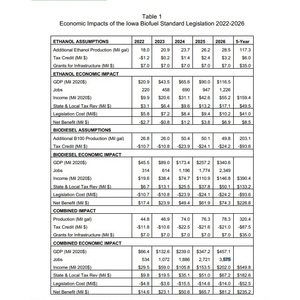Iowa biofuel standard would create jobs, grow economy

February 15, 2021
BY Erin Krueger
Legislation recently introduced in Iowa that aims to establish a state biofuels standard would create more than 3,500 new jobs and generate nearly $550 million in household income by 2026, according to a study released by the Iowa Renewable Fuels Association on Feb. 15. It will also add more than $450 million to Iowa’s GDP, which in turn generates approximately $182 million in new state and local tax revenue by 2026.
Iowa Gov. Kim Reynolds introduced the bill on Feb. 8. If signed into law, the legislation would set a 10 percent minimum ethanol standard for gasoline fuel and an 11 percent minimum biodiesel standard for diesel fuel. Both standards would have limited exceptions. The biodiesel standard would increase to 20 percent blends during the summer months, starting in 2024. The bill would also give the governor the discretion to increase the ethanol standard to 15 percent beginning in 2025.
Advertisement
Advertisement
The bill also adds $5 million from the general fund for the Iowa Renewable Fuels Infrastructure Program. That is in addition to the $5 million from the separate Rebuild Iowa Infrastructure Fund called for in the governor’s budget proposal, according to the IRFA. The legislation would reduce the cost of existing biofuels tax credits to more than offset the increase in RFIP.
The study released by the IRFA on Feb. 15 was authored by John Urbanchuk of ABF Economics. He found that the bill would increase ethanol demand and production in Iowa by 117 million gallons and biodiesel production by 203 million gallons between 2022 and 2026.
Approximately $341 million of the estimated $457 boost to Iowa’s GDP would come from biodiesel. The remaining $116 increase would be provided by ethanol. The boost in biodiesel blending would also be responsible for approximately 2,350 new jobs, while increased ethanol demand would add approximately 1,125 jobs.
Advertisement
Advertisement
“If you look at it from a state of Iowa standpoint, from a consumer standpoint, from a taxpayer standpoint, this is a really good piece of legislation,” said Monte Shaw, executive director of the IRFA. “The Iowa Biofuel Standards will boost farm income and support thousands of jobs while generating millions in tax revenue to help with Iowa’s economic recovery. The standards bill will create stable market demand for Iowa farmers and biofuels producers right here in Iowa, provide retailers with the resources they need to upgrade infrastructure to offer higher biofuel blends, and give consumers greater access to cleaner, lower-cost fuel options. It will do all of this while also adding to the bottom line of both Iowa families and the state’s general fund. It’s a win all the way around.”
A full copy of the study can be downloaded from the IRFA website.
Related Stories
Calumet Inc. on Aug. 8 confirmed its Montana Renewables biorefinery is currently running at full capacity. An initial phase of the company’s MaxSAF initiative remains on track to boost SAF capacity to up to 150 MMgy by mid-2026.
The USDA maintained its outlook for 2025-’26 soybean oil use in biofuel production in its latest World Agricultural Supply and Demand Estimates report, released Aug. 12. The forecast for soybean oil prices was also unchanged.
U.S. soybean production for 2025 is forecast at 4.29 billion bushels, down 2% when compared to last year, according to the USDA National Agricultural Statistics Service’s latest monthly Crop Production report, released Aug. 12.
Marathon Petroleum Corp. on Aug. 5 released second quarter financial results, reporting improved EBITDA for its renewable diesel segment. The company primarily attributed the improvement to increased utilization and higher margins.
Chevron Corp. on Aug. 1 confirmed the company started production at the Geismar renewable diesel plant in Louisiana during the second quarter after completing work to expand plant capacity from 7,000 to 22,000 barrels per day.
Upcoming Events










